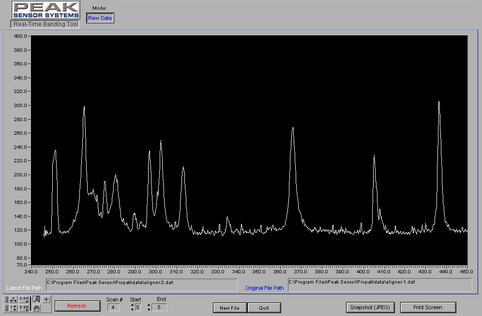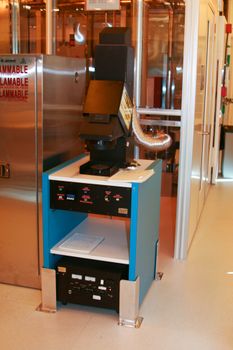DUV Flood Expose: Difference between revisions
Jump to navigation
Jump to search
Content deleted Content added
No edit summary |
linked to uses of DUV flood expose |
||
| (8 intermediate revisions by 4 users not shown) | |||
| Line 1: | Line 1: | ||
<br />{{tool2|{{PAGENAME}} |
|||
<nowiki><nowiki>Insert non-formatted text here</nowiki><nowiki><nowiki>Insert non-formatted text here</nowiki></nowiki></nowiki>{{tool|{{PAGENAME}} |
|||
|picture=DUV.jpg |
|picture=DUV.jpg |
||
|type = Lithography |
|type = Lithography |
||
|super= |
|super= Lee Sawyer |
||
|super2= Bill Millerski |
|||
|phone=(805)839|cell=(805)245-9356 |
|||
|phone=(805)893-2123 |
|||
|location=Bay 6 |
|location=Bay 6 |
||
|email= |
|email=lee_sawyer@ucsb.edu |
||
|description = Deep UV Flood |
|description = 1000W Deep UV Flood Exposure System (LS-150X-10C2) and Illumination Controller (2130-C2) |
||
|manufacturer = AB Manufacturing |
|manufacturer = Bachur & Associates/AB Manufacturing |
||
|materials = |
|materials = |
||
}} |
}} |
||
= |
==About== |
||
This unit consists of a collimated deep ultraviolet (DUV) light source (mercury gas discharge short arc lamp) and power supply. The substrate is placed on a rotating chuck (not presently working) and is exposed by opening a timer-controlled shutter. |
This unit consists of a collimated deep ultraviolet (DUV) light source (mercury gas discharge short arc lamp) and power supply. The substrate is placed on a rotating chuck (not presently working) and is exposed by opening a timer-controlled shutter. |
||
Materials that are exposed are primarily spun-on thin films such as PMMA, PMGI, etc. |
Materials that are exposed are primarily spun-on thin films such as PMMA, PMGI, etc. |
||
DUV exposure can be used to: |
|||
| ⚫ | |||
| ⚫ | |||
# Expose PMGI underlayers - see the [[Lithography Recipes#Lift-Off Recipes|liftoff recipes]] for recipes. |
|||
# Harden the top of resists before develop, creating "lip" for better liftoff. [https://wiki.nanofab.ucsb.edu/w/images/b/bc/Liftoff-Techniques.pdf See the Liftoff Tutorial for an example]. |
|||
# Expose DUV resists for edge-bead removal: [[Photolithography - Manual Edge-Bead Removal Techniques#DUV Photo-EBR Process|see the EBR page for recipes]]. |
|||
| ⚫ | |||
| ⚫ | |||
*The full spectrum of Hg emission wavelengths from 200-450 nm is present on the sample |
*The full spectrum of Hg emission wavelengths from 200-450 nm is present on the sample |
||
*Exposure can be performed on a 4" wafer |
*Exposure can be performed on a 4" wafer |
||
*Lamps are nominally rated for 400 hours |
*Lamps are nominally rated for 400 hours |
||
*A reset timer was added in Feb. 1995 to limit "on" time (ie. provide for auto shut-off) for bulb life conservation |
*A reset timer was added in Feb. 1995 to limit "on" time (ie. provide for auto shut-off) for bulb life conservation |
||
| ⚫ | |||
| ⚫ | |||
| ⚫ | |||
| ⚫ | |||
| ⚫ | |||
| ⚫ | |||
==Operating Procedures== |
|||
*[https://wiki.nanofab.ucsb.edu/w/images/8/89/DUV_Flood_Expose_SOP_Rev_C.pdf DUV Flood Expose Standard Operating Procedure] |
|||
Latest revision as of 04:24, 6 December 2025
| ||||||||||||||||||||||||||
About
This unit consists of a collimated deep ultraviolet (DUV) light source (mercury gas discharge short arc lamp) and power supply. The substrate is placed on a rotating chuck (not presently working) and is exposed by opening a timer-controlled shutter.
Materials that are exposed are primarily spun-on thin films such as PMMA, PMGI, etc.
DUV exposure can be used to:
- Expose PMGI underlayers - see the liftoff recipes for recipes.
- Harden the top of resists before develop, creating "lip" for better liftoff. See the Liftoff Tutorial for an example.
- Expose DUV resists for edge-bead removal: see the EBR page for recipes.
Detailed Specifications
- DUV wavelengths are 200-260 nm; the lamp power is limited to 1000 Watts and can operate in either constant intensity or constant power mode
- The full spectrum of Hg emission wavelengths from 200-450 nm is present on the sample
- Exposure can be performed on a 4" wafer
- Lamps are nominally rated for 400 hours
- A reset timer was added in Feb. 1995 to limit "on" time (ie. provide for auto shut-off) for bulb life conservation
Spectra Images
DUV Exposure System Spectra

